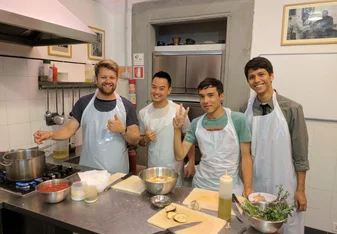A Guide to Non-Traditional Study Abroad Programs
Do you crave getting outside of the classroom to gain on-the-ground experiences? Here is a guide to alternative study abroad experiences and how to find a program that fits your goals.
TL;DR 👀
- Non-traditional study abroad programs provide an educational experience through travel, field work, and service-learning in lieu of traditional coursework
- Benefits of culturally immersive experiences include improve creativity, empathy, and self-reliance
- Students with a high degree of independence and a drive for adventure should consider non-traditional study abroad programs
- There are fantastic program providers offering students alternatives to traditional study abroad programs
- Your non-traditional study abroad program has the chance to make a real impact on your life and the lives of others

Whatever comes to mind when you think of study abroad, be it learning Mandarin in Shanghai, studying the history of the Roman Empire in Rome, or brushing up on finance skills in London, chances are a classroom is involved. But studying abroad doesn’t have to be so rigidly defined.
An experience like this gives students the opportunity to peel back layers of perspectives they’ve been socialized into.
Increasingly popular non-traditional study abroad programs are turning the notion of studying in classrooms overseas on its head and giving participants a different way to learn while traveling. But what are they exactly? And how can you find an alternative study abroad program? Read on for the full inside scoop on non-traditional study abroad programs.
What are non-traditional study abroad programs?

Non-traditional study abroad programs break from the mold of taking academic courses at one institution overseas. Also known as alternative or extreme study abroad, this new wave of options mixes things up through a focus on travel, service-learning, or cultural immersion instead of more traditional coursework.
These programs can last the standard length of a semester or year or can be shorter, ranging from a few days to several weeks. The flexibility in program length offers students who may have difficulties breaking away from a rigorous course schedule the chance to go overseas and gain insight through a new experience.
Benefits of non-traditional study abroad

In addition to greater flexibility with academic scheduling that alternative programs allow for, there are many benefits that these programs provide students. Research shows that learning out of the classroom can lead to increased creativity, independence, and new knowledge.
Alternative study abroad programs tend to focus more on being immersed in a culture. Instead of living in a dorm with other international students, perhaps you’ll live with a local family (homestay) or camp out in a community church. These living situations often provide a more authentic cultural experience.
Researchers in the journal Applied Cognitive Psychology found that “cultural experiences from living abroad have wide-reaching benefits on students’ creativity, including the facilitation of complex cognitive processes that promote creative thinking.”
Creative thinkers excel in the classroom and the workplace because they approach tasks with a broader approach, finding new and innovative solutions to existing problems and new opportunities to take projects to the next level. Creative thinkers are more flexible, and this elasticity is needed more than ever in an ever-changing and diversifying global economy.
Many non-traditional study abroad programs also require students to show a greater deal of independence. Instead of studying independently by following a lecture, students may need to organize a group of volunteers for a construction project in Central America, gather data for a field study on native frogs in Australia, or even navigate a language barrier on a homestay in Japan. These experiences that lay outside of students' comfort zone will challenge them to be more self-reliant.
Another benefit of these programs is the types of knowledge they impart on participants. By learning outside the classroom, through fieldwork, volunteering, or travel, academics are reinforced in a new light. This can build perspective and help students determine future goals.
A committee in the British House of Commons found that “learning outside the classroom supports pupils’ learning and development. It has the potential to enrich and enliven teaching across all subjects.”
Indeed, just because students aren’t in a traditional classroom setting doesn’t mean they aren’t learning. The emotional impact of such experiences can also add a different layer of meaning to knowledge that can’t be found in a textbook, making the knowledge even more memorable and meaningful.
Who should consider non-traditional study abroad program?

There is no right way to study abroad, and every student should find a program that matches their personal learning style and goals.
Students who are more likely to enjoy non-traditional study abroad programs have a high level of independence and are searching for unique experiences. They should also be looking for a way to learn that doesn’t involve a classroom. Alternative study abroad programs will often narrowly focus on a specific topic, generally relevant to the program's location. This provides the opportunity for students to gain specialized experience in an area of interest.
Topics like sea turtle research in Brazil, wildlife management in Tanzania, or global health and human rights policies in Geneva are all examples of in-depth field studies best learned outside the classroom. Alternative study abroad programs approach topics like these through experiential, hands-on learning.
How to find non-traditional study abroad programs?

If you're looking for a non-traditional study abroad program, you should narrow your search to focus on your goals. Consider what topic you would like to focus on and the best place to get on-the-ground experience in that field. Also, consider your budget and language proficiency, or search for a country where you can study abroad without a language barrier.
Here at Go Overseas, we provide our community members a search tool that allows them to narrow their program search down by country, subject, language, and other important categories. Use this tool to find the program that best fits your goals.
For inspiration, here are some popular study abroad providers that offer non-traditional programs:
Verto Education
Verto provides students with the chance to travel the world while simultaneously completing their university degree. While gap years grow in popularity across the globe as students take a year off to travel the world, Verto offers that same opportunity without the drawback of delaying the pursuit of a degree.
SIT Abroad
SIT offers field-based academic study abroad programs designed to prepare students to be interculturally effective leaders, professionals, and citizens. SIT fosters individuals and organizations committed to responsible global citizenship and offers undergraduate programs, accredited master’s degrees, and certificate programs for graduates and professionals.
The School for Field Studies (SFS)
The School for Field Studies partners with local communities to allow students to explore the complex environmental issues these communities face through field-based learning and research. Students use creative thinking practices to contribute to sustainable solutions to these challenges. The SFS community is committed to environmental stewardship.
Outward Bound
Outward Bound offers courses in over 40 countries to teach students leadership skills through hands-on learning in the great outdoors. These programs provide challenging experiences in rugged and beautiful locations designed to push students to realize their potential and empathize with others.
LIU Global
The LIU Global teaches students leadership skills designed to develop leaders in the interconnected global economy. LIU Global coursework integrates classroom learning with fieldwork, emphasizing the development of global leadership skills, increasingly vital for success in today’s global workforce.
Real-world experiences lead to real-world impact

While studying abroad will enormously impact your life, no matter the program you choose, there is also an entire world outside the classroom. Your participation in a non-traditional study abroad program can make a real impact on people's lives.
SIT Abroad program alum, Jon Lyons, reflects on the lasting impact his alternative study abroad program has had on his life and career:
“As an undergraduate, a four-month stint experiencing Mongolia seemed a most compelling test of my anthropology coursework. Little did I know that Mongolia would come to feature prominently in both my personal pursuits and professional development for years to come. My language learning and independent study left lasting impressions on my outlook, instilling a sense of self-reliance and willingness to relate.”
After graduating, Jon worked in several neighboring countries before returning to Mongolia to lead an economic development group. He has spent ten years focusing on local issues within Mongolia. He currently connects Mongolian business and sustainability resources with Global Green Growth Institute.
Jon is just one example of someone whose dreams and life work began during their study abroad experience. Are you also searching for a non traditional study abroad program that just might alter the trajectory of your career? Continue your research and discover the 10 best places to study abroad. If you've already found the program and destination of your dreams, find funding by applying to study abroad scholarships and grants today!



